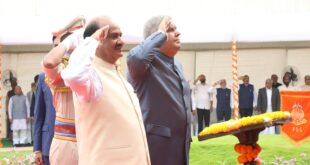By: Asad Mirza
Azadi has become a dirty word these days, whereas it has always been regarded as the most sacred tenet of human existence throughout the world. The expression of Azadi in the post-colonial era widely differs in the strict sense of the term, as it was used then and as it is used now.
The word Azadi in today’s world means ‘Liberty’ or ‘Emancipation’ from suppression or coercion in whatever way but unfortunately, now this is regarded more often as a call for rebellion which is grossly untrue as can be understood from the manner and attitude of the people who demand this.
So, should a slogan for Azadi in a peaceful demonstration be treated as unlawful rebellion? By law and constitution, it’s not only permissible but the core principle of democracy.
Article 19 of the Constitution of India provides the right to freedom with the view of guaranteeing individual rights that were considered vital by the framers of the constitution. The right to freedom in Article 19 guarantees the freedom of speech and expression, as one of its six freedoms.
The Constitution of India Bill 1895, widely considered to be the first Indian articulation of a constitutional vision, contained the following provision related to freedom of speech and expression – ‘Every citizen may express his thoughts by words or writings, and publish them in print without liability to censure, but they shall be answerable to abuses, which they may commit in the exercise of this right, in the cases and in the mode the Parliament shall determine.’
As recently as 2018, a SC bench of Justices A K Sikri and Ashok Bhushan on 23 July 2018, allowed peaceful demonstrations at Boat Club, where such activity was banned since 1993 and Jantar Mantar, where the NGT had, on October 5, 2017, banned all protests around Jantar Mantar for “violating” green laws.
The bench said, “The right to protest is recognised as a fundamental right under the Constitution. This right is crucial in a democracy which rests on participation of an informed citizenry in governance,” The bench further observed that this right is crucial in a vibrant democracy like India but more so in the Indian context to aid in the assertion of the rights of the marginalised and poorly represented minorities. This right (to protest) is also crucial since it strengthens representative democracy by enabling direct participation in public affairs where individuals and groups are able to express dissent and grievances, expose flaws in governance and demand accountability from state authorities as well as powerful entities.
Now constitutionally your right to protest or dissent is established, but when you collect to protest against an issue, you need a word like a marketing or advertising USP (unique selling proposition) of your demonstration, transformed into a single phrase or a word, and the winner in most of the cases is the word Azadi.
But as soon as the word Azadi is raised, the hackles of the political establishment, of whichever hue it may be and the temperature of the guarding security forces are raised, as they take the literal translation of the word as ‘Freedom’.
In reality though Azadi has become a euphemism for every demand or a cry against the unjust law or action and the protestors in no way means getting freedom. Freedom from what? Freedom from unjust practices and laws, nothing else.
Most of the media and anchors of various TV channels now a days turn hoarse saying that the demonstrators were raising slogans in favour of ‘freedom’ or asking for ‘freedom’.
What they and their masters fail to realise is that the demonstrators were in reality trying to get the attention of the authorities by using a word, which in reality turn the authorities to see red as soon as they hear it.
We should not forget that the word Azadi was used first by Lokmanya Tilak who gave us the slogan, ‘Freedom is my birth right’. To Gandhi ‘Swaraj’, was the raison d’etre of our freedom movement. Unfortunately the political establishment and the security forces link Azadi to the same meaning for which the word was used against the Britishers in our freedom struggle.
But here they are wrong; no Indian in the present age can demand Azadi in its literal sense. From whom is it demanding Azadi then? The corrupt and wrong practices or orders or decisions of the political establishment. And in order to get its voice reach the ears of the biggest echelon of our system, they use a word, which simply turns them against it and block all communication process between the ruled and the rulers.
- Our political leaders, administration and security forces should learn to take the word Azadi in its true non-literal sense and accept what it stands for, instead of trying to turn the word against the demonstrators and their demands.
 Gawah (The Witness) – Latest News, Current Affairs, Politics, Sports, Religion, Literature, Technology, Education, National, Local – Hyderabad Telangana India World Fearless By Birth, Pristine by Choice – First National Urdu Weekly From South India – Latest News, Breaking News, Special Stories, Interviews, Islamic, World, India, National News
Gawah (The Witness) – Latest News, Current Affairs, Politics, Sports, Religion, Literature, Technology, Education, National, Local – Hyderabad Telangana India World Fearless By Birth, Pristine by Choice – First National Urdu Weekly From South India – Latest News, Breaking News, Special Stories, Interviews, Islamic, World, India, National News





